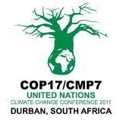 Simon Johnson discusses the Durban UNFCCC international climate negotiations through the historic lens of the Second World War and the Rio 1992 Earth Summit.
Simon Johnson discusses the Durban UNFCCC international climate negotiations through the historic lens of the Second World War and the Rio 1992 Earth Summit.
In a very considered comment at Hot Topic yesterday, David Lewis questions whether the Durban UNFCCC international climate negotiations can come up with a binding treaty that effectively reduces greenhouse concentrations, given the existing public will.
“I don’t see how negotiations on an international climate treaty can proceed to an agreement that would actually stabilise the composition of the atmosphere at a level that would not cause [dangerous anthropogenic interference] without more demand for such an agreement coming from the global population”
Lewis compares the public world-wide demand for action in the international climate change negotiations with the changing British attitudes to ‘Total War’ with Hitler’s Germany in 1940. Lewis implies that in the climate change negotiations, each government is “trapped in a circumstance where it can’t generate the national will that’s necessary”.
Continue reading “Call the COPs: Neville Chamberlain only went to Munich once”

 Hot off the wires: Hot Topic’s Durban correspondent Cindy Baxter posts her first insider’s view from COP 17.
Hot off the wires: Hot Topic’s Durban correspondent Cindy Baxter posts her first insider’s view from COP 17. How better to journey to the
How better to journey to the  “One word sums up the attitude of engineers towards climate change: frustration.” That’s Colin Brown, director of engineering at the UK’s Institution of Mechanical Engineers,
“One word sums up the attitude of engineers towards climate change: frustration.” That’s Colin Brown, director of engineering at the UK’s Institution of Mechanical Engineers,